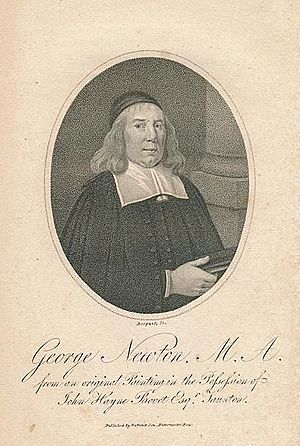George Newton (minister) facts for kids
George Newton (born 1602, died 1681) was an English minister who didn't follow the official church rules of his time. He was one of many ministers who lost their jobs because of their beliefs.
Contents
Life of George Newton
George Newton was born in Devon, England. He went to Exeter College, Oxford, a famous university. He earned his first degree in 1621 and a master's degree in 1624.
Early Ministry and Challenges
Newton started his work as a minister in a place called Bishop's Hull. Later, in 1631, he became the vicar of St. Mary Magdalene, Taunton. This was a big church in Taunton, Somerset.
In 1633, King Charles I's government issued a rule called the Declaration of Sports. This rule said that people could play sports on Sundays after church. Ministers were told to read this rule to their church members.
Newton read the rule, but he also read a part of the Bible (Exodus chapter 20). He told his church that the King's rule and God's rule seemed to be different. He let his church members decide which rule they wanted to follow. This showed he was brave and stood up for his beliefs.
During the English Civil War
From 1642 to 1645, there was a big fight in England called the English Civil War. Taunton was a town that both sides, the Parliament and the King, wanted to control. During this time, Newton went to St. Albans and preached there.
After the Parliament's army finally took control of Taunton, Newton returned. In 1654, he was chosen to help remove ministers who were not doing their jobs well. Around this time, a man named Joseph Alleine became his assistant. Newton also married Theodosia Alleine. She started a boarding school in their home, which had many students.
Later Years and Imprisonment
After the King returned to power in 1660 (this was called the English Restoration), new rules were made. The Act of Uniformity 1662 said that all ministers had to follow the Church of England's rules exactly. Because George Newton did not agree with all these rules, he lost his job in 1662.
Even after losing his job, Newton continued to preach. This was against the law at the time. He was arrested and spent several years in prison. After he was released, he became a minister for a group of people who met in Paul Street, Taunton.
George Newton passed away on June 12, 1681. He was buried in the church he once served, St. Mary Magdalene's Church. People said his preaching was "plain, profitable, and successful," meaning it was easy to understand, helpful, and made a difference.
Published Works
George Newton also wrote books and sermons. One of his books was called Exposition and Notes on the 17th Chapter of John, published in 1670. He also published several sermons, which are speeches given in church.
Some of his sermons included:
- Man's Wrath and God's Praise (1646): This sermon was about a special day of thanks in Taunton. It celebrated the town's escape from a difficult siege (when an army surrounds a place).
- A Sermon preached on the 11th of May, 1652 (1652): This was another sermon given in Taunton, celebrating a great rescue that happened on that day.
 | Precious Adams |
 | Lauren Anderson |
 | Janet Collins |


